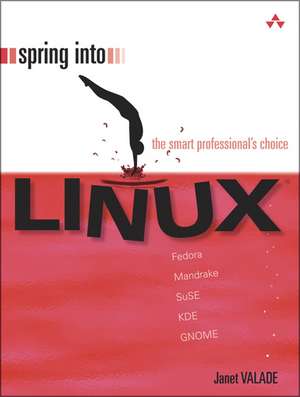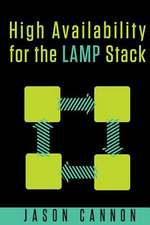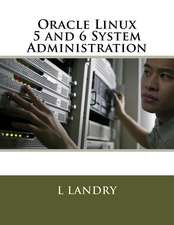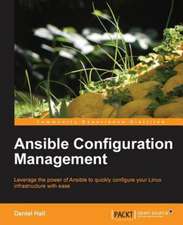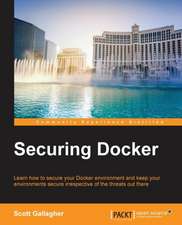Spring Into Linux: Spring Into...
Autor Janet Valadeen Limba Engleză Paperback – 30 apr 2005
estimates that Linux has now surpassed Apple with 3% of the desktop market,
and that this number will double by 2006.
And the new desktop users are not just students curious about a free operating
system, but working professionals who are familiar with Windows and who
find themselves needing to come up-to-speed quickly on Linux. They need to
quickly masters the Linux equivalents of Outlook, Microsoft Office, and
Internet Explorer. They need to understand how to customize their Linux
desktops so that they can be as productive as possible. And they need to do all
of this quickly.
They need Spring Into Linux. Written in the unique "Spring Into" style, this
book is organized as a series of one-page and two-page tutorials. Written for
professionals who don't need a lot of hand-holding, the information is quite
dense. Each tutorial contains at least one example of the concept or procedure
being described, with plenty of supporting screenshots.
Preț: 225.18 lei
Preț vechi: 281.47 lei
-20% Nou
Puncte Express: 338
Preț estimativ în valută:
43.09€ • 44.99$ • 35.66£
43.09€ • 44.99$ • 35.66£
Carte disponibilă
Livrare economică 14-28 martie
Preluare comenzi: 021 569.72.76
Specificații
ISBN-13: 9780131853546
ISBN-10: 0131853546
Pagini: 360
Ilustrații: Illustrations
Dimensiuni: 176 x 238 x 22 mm
Greutate: 0.67 kg
Ediția:1
Editura: Addison-Wesley Professional
Seria Spring Into...
Locul publicării:Boston, United States
ISBN-10: 0131853546
Pagini: 360
Ilustrații: Illustrations
Dimensiuni: 176 x 238 x 22 mm
Greutate: 0.67 kg
Ediția:1
Editura: Addison-Wesley Professional
Seria Spring Into...
Locul publicării:Boston, United States
Descriere
The Linux desktop is rapidly gaining as an alternative to Windows. IDC
estimates that Linux has now surpassed Apple with 3% of the desktop market,
and that this number will double by 2006.
And the new desktop users are not just students curious about a free operating
system, but working professionals who are familiar with Windows and who
find themselves needing to come up-to-speed quickly on Linux. They need to
quickly masters the Linux equivalents of Outlook, Microsoft Office, and
Internet Explorer. They need to understand how to customize their Linux
desktops so that they can be as productive as possible. And they need to do all
of this quickly.
They need Spring Into Linux. Written in the unique "Spring Into" style, this
book is organized as a series of one-page and two-page tutorials. Written for
professionals who don't need a lot of hand-holding, the information is quite
dense. Each tutorial contains at least one example of the concept or procedure
being described, with plenty of supporting screenshots.
estimates that Linux has now surpassed Apple with 3% of the desktop market,
and that this number will double by 2006.
And the new desktop users are not just students curious about a free operating
system, but working professionals who are familiar with Windows and who
find themselves needing to come up-to-speed quickly on Linux. They need to
quickly masters the Linux equivalents of Outlook, Microsoft Office, and
Internet Explorer. They need to understand how to customize their Linux
desktops so that they can be as productive as possible. And they need to do all
of this quickly.
They need Spring Into Linux. Written in the unique "Spring Into" style, this
book is organized as a series of one-page and two-page tutorials. Written for
professionals who don't need a lot of hand-holding, the information is quite
dense. Each tutorial contains at least one example of the concept or procedure
being described, with plenty of supporting screenshots.
Cuprins
Preface.
About the Author.
About the Series Editor.
1. Understanding Open Source Software.
Open Source Software
Open Source License
Linux Is Open Source Software
What Is GNU?
Summary
2. Choosing a Linux Distribution.
Distribution Contents
Red Hat/Fedora
Mandrake
SuSE
Other Distributions
Live CDs
Summary
3. Getting Ready to Install Linux.
Hardware Requirements
Hardware Compatibility
Purchasing Linux
Downloading Linux
Planning Your Computer System
Running Linux with Windows
Examining Your Hard Drive
Making Room for Linux During Installation
Making Room for Linux Before Installation
Booting from the CD or from a Floppy
Summary
4. Installation.
Installation Overview
Starting the Fedora Installation Procedure
Collecting Hardware Information for Fedora
Selecting the Installation Type for Fedora
Selecting Where to Install Fedora
Collecting Network Information for Fedora
Languages and Time Zone for Fedora
Creating the Root Account for Fedora
Selecting Packages to Install on Fedora
Installing the Fedora System
Starting the Mandrake Installation Procedure
Collecting Information for Mandrake
Selecting Packages to Install on Mandrake
Installing the Mandrake System
Creating Accounts for Mandrake
Configuration Summary for Mandrake
Finishing Mandrake Installation
Starting the SuSE Installation Procedure
Configuration Settings for SuSE
Selecting Packages to Install on SuSE
Installing the SuSE System
Configuring the Installed SuSE System
Finishing SuSE Installation
Summary
5. Interacting with Linux.
The Graphical User Interface on Linux
GNOME
KDE
The Command-Line Interface on Linux
Choosing the Interface
Summary
6. Using Your Desktop.
Logging In
Your First Login
Anatomy of a Desktop
KDE and GNOME Desktops
The Panel
Working on the Desktop
Configuring the Desktop
Changing the KDE Background
Changing the GNOME Background
Setting Fonts
Setting the Screen Saver
Organizing the Desktop
Changing the Panel Location and Size
Configuring Multiple Virtual Desktops
Logging Out
Summary
7. Using the Command Line.
Entering Commands
Entering a Single Command
Command-Line Syntax
Redirecting Input and Output
Running Commands in the Background
Editing the Command Line
Command-Line Help
Some Useful Commands
The sort Command
The grep Command
Configuring the Terminal Window
Summary
8. Linux Accounts.
Account Types
Groups
Account Information
Adding Accounts
Passwords
Group Information
Adding Groups
Forgotten Root Password
Summary
9. File Management.
File Organization
File Information
Examining Files from the Desktop
Examining Files from the Command Line
File Permissions
Changing Permissions
Managing Owners and Groups
File Types
Finding Files
Creating Directories, Files, and Links
Copying, Renaming, and Moving Files
Viewing and Editing Text Files
Deleting Files and Directories
Summary
10. Applications and Programs.
Programs
Linux Commands
Applications
Managing Application Software
Installing from the Distribution CDs
Installing from the Distribution Web Site
Finding Packages on the Internet
Installing Packages Using RPM
Installing Packages from Source Code
Summary
11. Word Processing.
Creating a Document
Menus and Toolbars
Formatting
Styles
Using Templates
Creating Templates
Editing Document Contents
Autocorrection
Spell Checking
Tables and Columns
Frames
Graphics in Documents
The Gallery
Document File Formats
Tracking Changes
Summary
12. Spreadsheets.
Creating a Spreadsheet
Menus and Toolbars
Formatting Cells
Formatting Pages
Editing the Spreadsheet Content
Formulas and Functions
Saving and Printing
Summary
13. Graphics.
Graphics File Formats
Viewing Graphics Files
Scanning Documents
Presentation Graphics
Digital Cameras
Screen Shots
Diagramming with Dia
Drawing with OpenOffice Draw
Creating and Opening Images in the GIMP
The GIMP Toolbox
Changing Image Size in GIMP
Removing Elements from an Image in GIMP
Adding Elements to an Image in the GIMP
Working with Layers in the GIMP
Summary
14. Printing.
Installing Your Printer on Fedora
Installing Your Printer on Other Distributions
Printing
Managing Print Jobs
Summary
15. The Internet.
Accessing the Internet
Hardware for Accessing the Internet
Checking Your Network Connections
Adding a Dial-Up Network Connection
Adding a Broadband Network Connection
Web Browsers
Browsing with Mozilla
Mozilla Menus and Toolbars
The Mozilla Sidebar
Tabbed Browsing in Mozilla
Controlling Pop-Ups with Mozilla
Downloads, Forms, Passwords, and Cookies
Plug-Ins
Summary
16. Multimedia.
Configuring Your Sound Card
Playing Audio CDs
Downloading Music
Xmms
Rhythmbox
Video Players
RealPlayer
MPlayer
Listening to Radio
Copying Music Files from CD to Hard Disk
Summary
17. Email, Messaging, and News.
Email Accounts
Email Software
Setting Up an Email Account
Configuring Mozilla Email
Reading Email in Mozilla
Sending Email in Mozilla
Mozilla Message Filters
Creating a Message Filter in Mozilla
Spam
Mozilla Address Book
Adding and Editing Address Cards
Instant Messaging
Signing Up for AIM
Signing Up for MSN Messenger
Signing On with Gaim
IM Conversations
Newsgroups
Summary
18. Editing Text Files.
Opening a File in Kate
Editing in Kate
Kate Features for Programmers
Opening a File in vi
Editing and Saving Files with vi
Moving Around a File in vi
vi Editing Commands
Sample vi Editing Session
Summary
19. Shell Scripts.
A Simple Shell Script
The Basics of Variables and Arrays
Reading Data into Variables
Special Characters and Quotes
Flow Control
Testing Conditions
If Statements
Case Statements
For Loops
While Loops and Until Loops
Infinite Loops
Scheduling Scripts to Run Automatically
A Sample Script
Summary
Appendix A: Regular Expressions.
Appendix B: Command Reference.
Index.
About the Author.
About the Series Editor.
1. Understanding Open Source Software.
Open Source Software
Open Source License
Linux Is Open Source Software
What Is GNU?
Summary
2. Choosing a Linux Distribution.
Distribution Contents
Red Hat/Fedora
Mandrake
SuSE
Other Distributions
Live CDs
Summary
3. Getting Ready to Install Linux.
Hardware Requirements
Hardware Compatibility
Purchasing Linux
Downloading Linux
Planning Your Computer System
Running Linux with Windows
Examining Your Hard Drive
Making Room for Linux During Installation
Making Room for Linux Before Installation
Booting from the CD or from a Floppy
Summary
4. Installation.
Installation Overview
Starting the Fedora Installation Procedure
Collecting Hardware Information for Fedora
Selecting the Installation Type for Fedora
Selecting Where to Install Fedora
Collecting Network Information for Fedora
Languages and Time Zone for Fedora
Creating the Root Account for Fedora
Selecting Packages to Install on Fedora
Installing the Fedora System
Starting the Mandrake Installation Procedure
Collecting Information for Mandrake
Selecting Packages to Install on Mandrake
Installing the Mandrake System
Creating Accounts for Mandrake
Configuration Summary for Mandrake
Finishing Mandrake Installation
Starting the SuSE Installation Procedure
Configuration Settings for SuSE
Selecting Packages to Install on SuSE
Installing the SuSE System
Configuring the Installed SuSE System
Finishing SuSE Installation
Summary
5. Interacting with Linux.
The Graphical User Interface on Linux
GNOME
KDE
The Command-Line Interface on Linux
Choosing the Interface
Summary
6. Using Your Desktop.
Logging In
Your First Login
Anatomy of a Desktop
KDE and GNOME Desktops
The Panel
Working on the Desktop
Configuring the Desktop
Changing the KDE Background
Changing the GNOME Background
Setting Fonts
Setting the Screen Saver
Organizing the Desktop
Changing the Panel Location and Size
Configuring Multiple Virtual Desktops
Logging Out
Summary
7. Using the Command Line.
Entering Commands
Entering a Single Command
Command-Line Syntax
Redirecting Input and Output
Running Commands in the Background
Editing the Command Line
Command-Line Help
Some Useful Commands
The sort Command
The grep Command
Configuring the Terminal Window
Summary
8. Linux Accounts.
Account Types
Groups
Account Information
Adding Accounts
Passwords
Group Information
Adding Groups
Forgotten Root Password
Summary
9. File Management.
File Organization
File Information
Examining Files from the Desktop
Examining Files from the Command Line
File Permissions
Changing Permissions
Managing Owners and Groups
File Types
Finding Files
Creating Directories, Files, and Links
Copying, Renaming, and Moving Files
Viewing and Editing Text Files
Deleting Files and Directories
Summary
10. Applications and Programs.
Programs
Linux Commands
Applications
Managing Application Software
Installing from the Distribution CDs
Installing from the Distribution Web Site
Finding Packages on the Internet
Installing Packages Using RPM
Installing Packages from Source Code
Summary
11. Word Processing.
Creating a Document
Menus and Toolbars
Formatting
Styles
Using Templates
Creating Templates
Editing Document Contents
Autocorrection
Spell Checking
Tables and Columns
Frames
Graphics in Documents
The Gallery
Document File Formats
Tracking Changes
Summary
12. Spreadsheets.
Creating a Spreadsheet
Menus and Toolbars
Formatting Cells
Formatting Pages
Editing the Spreadsheet Content
Formulas and Functions
Saving and Printing
Summary
13. Graphics.
Graphics File Formats
Viewing Graphics Files
Scanning Documents
Presentation Graphics
Digital Cameras
Screen Shots
Diagramming with Dia
Drawing with OpenOffice Draw
Creating and Opening Images in the GIMP
The GIMP Toolbox
Changing Image Size in GIMP
Removing Elements from an Image in GIMP
Adding Elements to an Image in the GIMP
Working with Layers in the GIMP
Summary
14. Printing.
Installing Your Printer on Fedora
Installing Your Printer on Other Distributions
Printing
Managing Print Jobs
Summary
15. The Internet.
Accessing the Internet
Hardware for Accessing the Internet
Checking Your Network Connections
Adding a Dial-Up Network Connection
Adding a Broadband Network Connection
Web Browsers
Browsing with Mozilla
Mozilla Menus and Toolbars
The Mozilla Sidebar
Tabbed Browsing in Mozilla
Controlling Pop-Ups with Mozilla
Downloads, Forms, Passwords, and Cookies
Plug-Ins
Summary
16. Multimedia.
Configuring Your Sound Card
Playing Audio CDs
Downloading Music
Xmms
Rhythmbox
Video Players
RealPlayer
MPlayer
Listening to Radio
Copying Music Files from CD to Hard Disk
Summary
17. Email, Messaging, and News.
Email Accounts
Email Software
Setting Up an Email Account
Configuring Mozilla Email
Reading Email in Mozilla
Sending Email in Mozilla
Mozilla Message Filters
Creating a Message Filter in Mozilla
Spam
Mozilla Address Book
Adding and Editing Address Cards
Instant Messaging
Signing Up for AIM
Signing Up for MSN Messenger
Signing On with Gaim
IM Conversations
Newsgroups
Summary
18. Editing Text Files.
Opening a File in Kate
Editing in Kate
Kate Features for Programmers
Opening a File in vi
Editing and Saving Files with vi
Moving Around a File in vi
vi Editing Commands
Sample vi Editing Session
Summary
19. Shell Scripts.
A Simple Shell Script
The Basics of Variables and Arrays
Reading Data into Variables
Special Characters and Quotes
Flow Control
Testing Conditions
If Statements
Case Statements
For Loops
While Loops and Until Loops
Infinite Loops
Scheduling Scripts to Run Automatically
A Sample Script
Summary
Appendix A: Regular Expressions.
Appendix B: Command Reference.
Index.
Notă biografică
Janet Valade has 20 years experience in the computing ?eld. Her background includes experience as a technical writer for several companies, as a Web designer/programmer for an engineering ?rm, and as a systems analyst in a university environment where, for over 10 years, she supervised the installation and operation of computing resources, designed and developed a state-wide data archive, provided technical support to faculty and staff, wrote numerous technical papers and documentation, and designed and presented seminars and workshops on a variety of technology topics.
Janet currently has two published books—PHP & MySQL for Dummies, Second Edition, and PHP 5 for Dummies. In addition, she has authored chapters for several Linux and Web development books.
© Copyright Pearson Education. All rights reserved.
Janet currently has two published books—PHP & MySQL for Dummies, Second Edition, and PHP 5 for Dummies. In addition, she has authored chapters for several Linux and Web development books.
© Copyright Pearson Education. All rights reserved.
Textul de pe ultima copertă
The fastest route to true Linux mastery!
You know your way around Windows (or maybe a Mac, or even UNIX). Now, you're ready for Linux.
And you don't have a minute to waste.
Welcome. This book's for you.
Janet Valade has spent thirteen years helping new users master Linux and related technologies. She knows the "magic words" that'll help you get the job done, fast. (And she knows exactly how to keep you out of trouble, too!)
You'll learn Linux through dozens of focused, bite-size examples, each one carefully designed to build on what you've learned before.
Need specific solutions? This book's carefully crafted, high-efficiency format delivers them... instantly. Working on Fedora? Mandrake? SuSE? No matter. This book is for you.
No other introduction to Linux covers this much, this well, this quickly. Dig in, get started, get results!
Spring Into... is a new series of fast-paced tutorials from Addison-Wesley Professional Publishers. Each book in the series is designed to bring you up-to-speed quickly. Complex technologies are reduced to their core components, and each component is treated with remarkable efficiency in one- or two-page spreads. Just the information you need to begin working...now! And because the books are example-rich and easy to navigate, you'll find that they make great on-the-job references after you've mastered the basics.
© Copyright Pearson Education. All rights reserved.
You know your way around Windows (or maybe a Mac, or even UNIX). Now, you're ready for Linux.
And you don't have a minute to waste.
Welcome. This book's for you.
Janet Valade has spent thirteen years helping new users master Linux and related technologies. She knows the "magic words" that'll help you get the job done, fast. (And she knows exactly how to keep you out of trouble, too!)
You'll learn Linux through dozens of focused, bite-size examples, each one carefully designed to build on what you've learned before.
Need specific solutions? This book's carefully crafted, high-efficiency format delivers them... instantly. Working on Fedora? Mandrake? SuSE? No matter. This book is for you.
No other introduction to Linux covers this much, this well, this quickly. Dig in, get started, get results!
- All you need to succeed with Linux—without the hassles!
- Choose the best Linux distribution for your personal or business needs
- Get Linux installed quickly and running reliably
- Handle your day-to-day tasks and efficiently manage your files
- Master KDE, GNOME, and the Linux command line
- Write documents and build spreadsheets with OpenOffice.org
- Set up Web access, email, and instant messaging
- Work with powerful Linux multimedia and graphics software
- Find, install, and run new Linux software
- Set up your printer to work with Linux
- Supercharge Linux with shell scripts and customized configuration files
Spring Into... is a new series of fast-paced tutorials from Addison-Wesley Professional Publishers. Each book in the series is designed to bring you up-to-speed quickly. Complex technologies are reduced to their core components, and each component is treated with remarkable efficiency in one- or two-page spreads. Just the information you need to begin working...now! And because the books are example-rich and easy to navigate, you'll find that they make great on-the-job references after you've mastered the basics.
© Copyright Pearson Education. All rights reserved.
Caracteristici
The power and flexibility of the Linux desktop - for working professionals needing to get up to speed fast on Linux.
° From Janet Valade, best-selling PHP author and longtime Linux expert.
° Covers the three most popular versions of Linux: Fedora, SuSE, and Mandrake PLUS both the GNOME and KDE desktop suites
° Fast-paced: introductory tutorials give way to advanced topics such as the Linux command line and Linux shell scripts - all in the unique Spring Into one-page and two-page tutorial format.
° From Janet Valade, best-selling PHP author and longtime Linux expert.
° Covers the three most popular versions of Linux: Fedora, SuSE, and Mandrake PLUS both the GNOME and KDE desktop suites
° Fast-paced: introductory tutorials give way to advanced topics such as the Linux command line and Linux shell scripts - all in the unique Spring Into one-page and two-page tutorial format.
